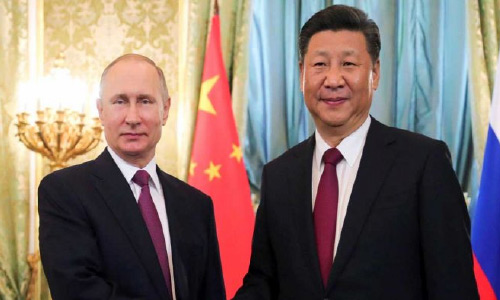MOSCOW — Russia’s Vladimir Putin and China’s Xi Jinping have established themselves as the world’s most powerful authoritarian leaders in decades. Now it looks like they want to hang on to those roles indefinitely.
Putin’s sudden announcement this week of constitutional changes that could allow him to extend control way beyond the end of his term in 2024 echoes Xi’s move in 2018 to eliminate constitutional term limits on the head of state.
That could give them many more years at the helm of two major powers that are frequently at odds with Washington and the West over issues ranging from economic espionage and foreign policy to democracy and human rights.
Putin cast his constitutional change proposals as a way to strengthen parliament and bolster democracy. Kremlin critics described the proposed changes as an attempt by Putin to secure his rule for life. However, the suggested reform was so vague and far-reaching that there was hardly any public outrage about it.
When Xi moved to remove term limits in March 2018, there was barely a murmur of dissent. The official explanation was that the office of head of state needed to align with those of the other top posts — party general secretary and chairman of the Central Military Commission. Other explanations aren’t discussed and even party-backed scholars say the issue is a taboo topic.
The son of a former high communist official, Xi worked his way up through a series of increasingly important provincial positions before taking over as party head in 2012. He then began to consolidate power through a multi-pronged strategy of eliminating dissent and enforcing discipline through an anti-corruption campaign whose scale was unprecedented in recent years.
Xi’s ending of term limits was seen as an attack on former leader Deng Xiaoping’s attempts to regularize and institutionalize power following the cult of personality surrounding Mao Zedong and the political chaos of the 1966-76 Cultural Revolution. Xi further upended the thin precedents set in recent years by refusing to indicate a potential successor, leading to speculation he plans to continue ruling well beyond his second five-year term.
Putin, a former KGB officer, first took office in 2000 and secured popularity with promises of economic stability and ending the drawn-out wars with Chechnya, Russia’s troublesome region in the North Caucasus. He, too, cemented his rule by suppressing the opposition — through enforcing stricter control over the country’s media and giving vast powers to law enforcement and the security services. He has led Russia for more than 20 years — the longest rule since Joseph Stalin.
Their public styles are different. Xi generally communicates his vision for a powerful, prosperous China in dry speeches and prepared comments, while Putin tends to be more loquacious.
The Russian leader is also frequently biting in his comments about critics and the West — a task Xi leaves to underlings such as Foreign Minister Wang Yi. (AP News)
Home » World » Putin’s, Xi’s Ruler-For-Life Moves Pose Challenges to West
Putin’s, Xi’s Ruler-For-Life Moves Pose Challenges to West

